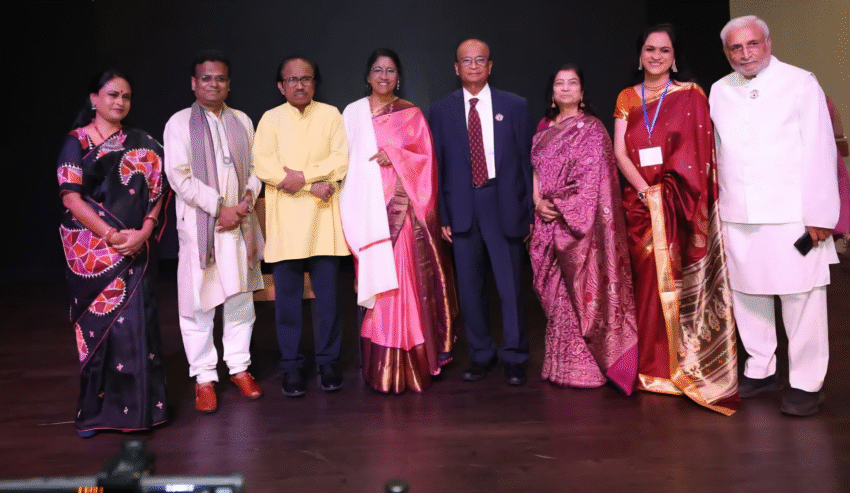
Naperville, IL — Indian Americans in Chicago witnessed a landmark cultural event on Friday, September 19, 2025, when two of India’s celebrated musical icons — Padma Shri recipient Kavita Krishnamurthy and Padma Vibhushan recipient Dr. L. Subramaniam — headlined a fundraising concert at The Matrix Club, Naperville, in support of Moksh Dham, the nation’s first dedicated Hindu cremation and last-rites center.

More than 1,200 attendees, including community leaders, spiritual advocates, and music enthusiasts, filled the prestigious venue. The evening blended melody and meaning, raising critical awareness and support for a project that fulfills one of the Indian-American community’s most heartfelt spiritual needs — a dignified and culturally authentic space for Antim Sanskar (final rites) in the United States.
Kavita Krishnamurthy — Bollywood and devotional playback legend, with more than 50,000 songs in 45 languages, performed timeless melodies and bhajans, reminding the audience why she remains one of India’s most cherished playback singers.
Dr. L. Subramaniam — India’s violin maestro, often called “the Paganini of Indian Classical Music,” performed a seamless fusion of Carnatic, Western classical, and world music traditions. A physician-turned-musician, Dr. Subramaniam is internationally recognized for his cross-genre collaborations and virtuosity.
The event began with a solemn Deep Pragtya (lamp-lighting ceremony), symbolizing illumination and spiritual awakening.

During the program, Moksh Dham recognized its Super Trustees — visionaries whose contributions of $25,000 or more are helping turn the project into reality. Honorees included: Mafat Patel, Ashok Pandya, Mahesh Pandya, Rajesh Patel, Bharat Barai, Nitin Patel, and Dr. Rashmi Patel.
Their leadership inspired further giving, as donation appeals led by Dr. Rashmi Patel and Dr. Bharat Barai encouraged attendees to join in building this sacred legacy.
Moksh Dham is a non-profit 501(c)(13) initiative led by Dr. Rashmi Patel. The vision is to create a serene, accessible, and culturally authentic facility where Hindu families — along with Jain, Sikh, and Buddhist communities — can perform Antim Agni-Sanskar (cremation rituals) with dignity.
The project, expected to be completed in 2027, addresses urgent community needs. The Chicago metro area’s 250,000 South Asians, 35% of whom are seniors, face limited and costly cremation options.Cremation requests have risen nearly 30% in recent years, yet facilities remain scarce. Families often encounter emotional and financial distress without culturally aligned services.
“This is not just a building — it’s a legacy,” said Dr. Patel. “Just as Lord Ram invited all to build the Setu, Moksh Dham is a collective effort. Every soul deserves a dignified farewell rooted in tradition.”
India’s Consul General in Chicago Somnath Ghosh, addressing the gathering, emphasized the project’s significance. “Cremation is not only a religious rite but a sacred passage to liberation. Moksh Dham fills a deep cultural and emotional void for our community here in America,” Consul General Ghosh said.



